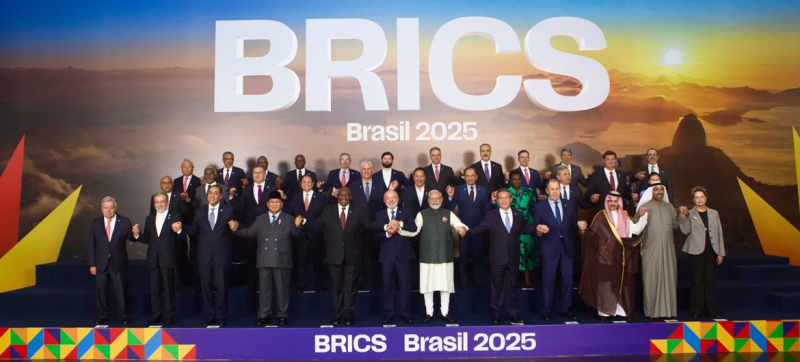- Puppet show enchants Children as Boi Mela comes alive on day 2 |
- DSCC Admin Salam’s drive to make South Dhaka a ‘clean city’ |
- 274 Taliban Dead, 55 Pakistan Troops Killed |
- Now 'open war' with Afghanistan after latest strikes |
- Dhaka's air quality fourth worst in world on Friday morning |
UN Chief Calls for Urgent Climate, AI and Global Reform

Global leaders demonstrate their solidarity at the BRICS meeting in Brazil.
UN Secretary-General António Guterres on Monday warned that the environment is under attack on all fronts and urged the international community to urgently address the intersection of health and climate issues.
Speaking at the 17th BRICS summit in Rio de Janeiro, Brazil, he highlighted the human toll of environmental devastation and climate change. As environmental disasters intensify, progress on the Sustainable Development Goals is also being derailed.
"Across the world, lives and livelihoods are being ripped apart, and sustainable development gains are left in tatters as disasters accelerate," Mr Guterres said.
"The impact on human health is atrocious... the vulnerable and the poor pay the highest price."
BRICS was founded by Brazil, Russia, India, and China in 2006. South Africa joined in 2011, and since then, Egypt, Ethiopia, Indonesia, Iran, Saudi Arabia, and the United Arab Emirates have also joined. Collectively, these eleven States represent over half of the world’s population and approximately one-third of the global GDP.
On Sunday, Mr Guterres addressed a session on strengthening multilateralism, economic-financial affairs, and artificial intelligence, calling for efforts to “minimise the risks and maximise the potential” of this breakthrough technology.
“Artificial intelligence is reshaping economies and societies. The fundamental test is how wisely we guide this transformation—how we minimise the risks and maximise the potential for good,” he said.
To harness its full potential, the Secretary-General stressed that AI must not be “a club of the few,” but should benefit everyone. He called for the “real voice” of developing countries to be included in global AI governance.
He added that human rights and equity must be the guiding principles in shaping any international governance structure for AI.
“We cannot govern AI effectively—and fairly—without addressing deeper, structural imbalances in our global system,” he added.
Mr Guterres also emphasised the need for peace amid ongoing conflicts in Gaza, Ukraine, Sudan, and Myanmar.
He called for urgent reform of global institutions, stating that bodies like the UN Security Council and international financial systems were “designed for a bygone age, a bygone world, with a bygone system of power relations.”
“The reform of the Security Council is crucial,” he said, also referencing calls from the recent Financing for Development conference in Sevilla.
Top priorities, he said, include giving developing countries a greater voice in global governance, enabling effective debt restructuring, and tripling multilateral bank lending—especially in concessional and local-currency terms.
Mr Guterres concluded his remarks by underlining the power of cooperation and trust.
“At a time when multilateralism is being undermined, let us remind the world that cooperation is humanity’s greatest innovation,” he said.
“Let us rise to this moment—and reform and modernise multilateralism, including the UN and all global systems and institutions—to make them work for everyone, everywhere.”

